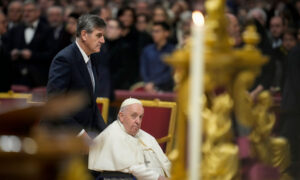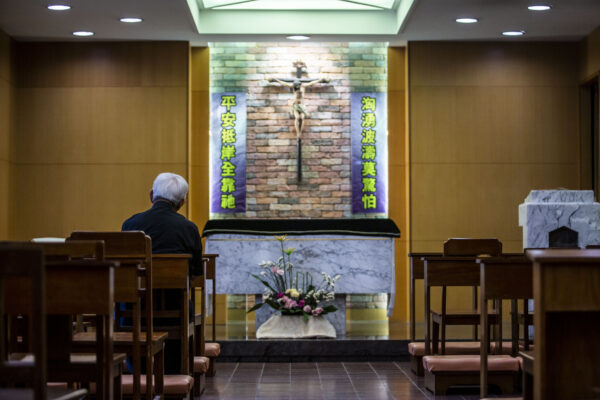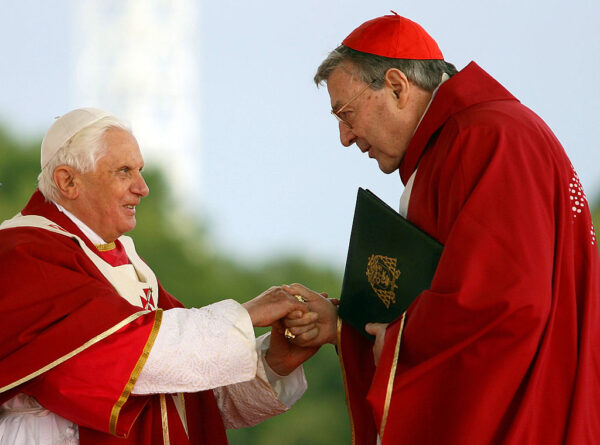Is It Time to Cancel Pope Francis?
Commentary The deaths of Pope Emeritus Benedict XVI and Cardinal George Pell, within 11 days of each other, have focused attention on Pope Francis’ legacy. Jorge Bergoglio was elected pope to stem the flow of the faithful away from the Church, particularly in South America, clean up Church finances, and sexual abuse scandals. However, on these counts and so many others, Francis’ papacy has been a litany of failures. These have been laid bare in the Demos document (Greek for people)—a statement attributed to Pell on the state of the Church that is being passed around by cardinals. In it, Francis’ papacy has been described as “catastrophic.” In South America, the Protestant expansion grows ever larger. However, Pope Francis has never been back to his native Argentina. Why? La Nación, Argentina’s biggest daily newspaper, reported in 2019 that then-Cardinal Jorge Bergoglio had been active in protecting convicted paedophile priests or promoting those who have covered up clergy abuse in the past. These include Bishop Gustavo Zanchetta, who in 2017 was appointed Assessor of the Administration of the Patrimony of the Apostolic despite seven priests—including three of Zanchetta’s vicar generals—formally accusing him of financial mismanagement, authoritarianism, and sexual misconduct. Last year, Zanchetta was found guilty of sexually abusing two seminarians. In terms of the Vatican’s global influence, this had become negligible, the Demos document noted. In this picture taken on Sept. 11, 2020, Cardinal Joseph Zen, former bishop of Hong Kong, prays in the chapel at his residence in Hong Kong. (Isaac Lawrence/AFP via Getty Images) There had been grave failures to support human rights in Venezuela, Nicaragua, Hong Kong, mainland China, and the Russian invasion of Ukraine. Under the secret Vatican-China pact, there had been “no public support for the loyal Catholics in China who have been intermittently persecuted for their loyalty to the Papacy for more than 70 years.” When the former Bishop of Hong Kong, Cardinal Joseph Zen, flew to Rome to discuss the issue with the Vatican, Pope Francis refused to meet with him. He has declined to meet the Dalai Lama or speak out against the persecution of the Uyghurs. As far as financial matters are concerned, the Demos statement noted that the Church’s financial situation was grave. After a decade of deficits of about 20 million Euros (US$22 million) a year before COVID, they had reached 30 to 25 million Euros a year. The Vatican is facing an 800 million Euro pension fund deficit in 2030. As Prefect for the Economy in Rome, Pell was obstructed in his efforts to clean up the Church’s finances by Cardinal Angelo Becciu, the deputy to Secretary of State Cardinal Parolin (who oversaw the aforementioned Vatican agreement with Beijing). Becciu is now the subject of the “trial of the century” involving cases of alleged financial wrongdoing in the Vatican. Seeped in Neo-Marxism Cardinal Pell’s scathing Spectator article, published a day after his passing, spoke of the “toxic nightmare” of the upcoming October Synod on Synodality. In the Synod documents, “couched in neo-Marxist jargon” and “hostile to the apostolic tradition,” there is no mention of the Church’s fundamental mission: “Go and make disciples of all nations, baptising them in the Name of the Father and of the Son and of the Holy Spirit, and teaching them to obey everything that I have commanded you.” (St Matthew 28: 19-20). Pope Benedict XVI shakes hands with Cardinal George Pell during the Final Mass at Southern Cross Precinct during World Youth Day in Sydney, Australia, on July 20, 2008. (World Youth Day via Getty Images) Pell, in his Campion College lecture last August, said it was “largely irrelevant to the preaching of the gospel and the threat of decline, being more concerned with the redistribution of power.” The Synod doubles down on the failed experiment of “aggiornamento” (updating) that has taken place in the Church since the late 1960s, which has led to dwindling congregations, except in parishes and orders that are faithful to tradition, doctrine, and the Church’s magisterium. However, these areas of the Church have been under constant attack by Pope Francis, especially with regard to the crackdown on the celebration of the Traditional Latin Mass. Rather than being a source of “disunity” within the Church, its wider celebration allowed those who find in the traditional liturgy a sense of the sacred that is often not present in the tacky vernacular liturgies on offer in most parishes, to not become separated from the Church. Cardinal Pell regarded it as a “fair go” for those faithful. Read MoreWhy the Pope Is Wrong About Latin Mass Restrictions The next pope must “understand that the secret of Christian and Catholic vitality comes from fidelity to the teachings of Christ … It does not come from adapting to the world or from money,” Demos stated. Jesus told disciples at the Last Supper (

Commentary
The deaths of Pope Emeritus Benedict XVI and Cardinal George Pell, within 11 days of each other, have focused attention on Pope Francis’ legacy.
Jorge Bergoglio was elected pope to stem the flow of the faithful away from the Church, particularly in South America, clean up Church finances, and sexual abuse scandals. However, on these counts and so many others, Francis’ papacy has been a litany of failures.
These have been laid bare in the Demos document (Greek for people)—a statement attributed to Pell on the state of the Church that is being passed around by cardinals. In it, Francis’ papacy has been described as “catastrophic.”
In South America, the Protestant expansion grows ever larger. However, Pope Francis has never been back to his native Argentina. Why?
La Nación, Argentina’s biggest daily newspaper, reported in 2019 that then-Cardinal Jorge Bergoglio had been active in protecting convicted paedophile priests or promoting those who have covered up clergy abuse in the past.
These include Bishop Gustavo Zanchetta, who in 2017 was appointed Assessor of the Administration of the Patrimony of the Apostolic despite seven priests—including three of Zanchetta’s vicar generals—formally accusing him of financial mismanagement, authoritarianism, and sexual misconduct. Last year, Zanchetta was found guilty of sexually abusing two seminarians.
In terms of the Vatican’s global influence, this had become negligible, the Demos document noted.

There had been grave failures to support human rights in Venezuela, Nicaragua, Hong Kong, mainland China, and the Russian invasion of Ukraine. Under the secret Vatican-China pact, there had been “no public support for the loyal Catholics in China who have been intermittently persecuted for their loyalty to the Papacy for more than 70 years.”
When the former Bishop of Hong Kong, Cardinal Joseph Zen, flew to Rome to discuss the issue with the Vatican, Pope Francis refused to meet with him. He has declined to meet the Dalai Lama or speak out against the persecution of the Uyghurs.
As far as financial matters are concerned, the Demos statement noted that the Church’s financial situation was grave. After a decade of deficits of about 20 million Euros (US$22 million) a year before COVID, they had reached 30 to 25 million Euros a year. The Vatican is facing an 800 million Euro pension fund deficit in 2030.
As Prefect for the Economy in Rome, Pell was obstructed in his efforts to clean up the Church’s finances by Cardinal Angelo Becciu, the deputy to Secretary of State Cardinal Parolin (who oversaw the aforementioned Vatican agreement with Beijing).
Becciu is now the subject of the “trial of the century” involving cases of alleged financial wrongdoing in the Vatican.
Seeped in Neo-Marxism
Cardinal Pell’s scathing Spectator article, published a day after his passing, spoke of the “toxic nightmare” of the upcoming October Synod on Synodality.
In the Synod documents, “couched in neo-Marxist jargon” and “hostile to the apostolic tradition,” there is no mention of the Church’s fundamental mission:
“Go and make disciples of all nations, baptising them in the Name of the Father and of the Son and of the Holy Spirit, and teaching them to obey everything that I have commanded you.” (St Matthew 28: 19-20).

Pell, in his Campion College lecture last August, said it was “largely irrelevant to the preaching of the gospel and the threat of decline, being more concerned with the redistribution of power.”
The Synod doubles down on the failed experiment of “aggiornamento” (updating) that has taken place in the Church since the late 1960s, which has led to dwindling congregations, except in parishes and orders that are faithful to tradition, doctrine, and the Church’s magisterium.
However, these areas of the Church have been under constant attack by Pope Francis, especially with regard to the crackdown on the celebration of the Traditional Latin Mass.
Rather than being a source of “disunity” within the Church, its wider celebration allowed those who find in the traditional liturgy a sense of the sacred that is often not present in the tacky vernacular liturgies on offer in most parishes, to not become separated from the Church.
Cardinal Pell regarded it as a “fair go” for those faithful.
The next pope must “understand that the secret of Christian and Catholic vitality comes from fidelity to the teachings of Christ … It does not come from adapting to the world or from money,” Demos stated.
Jesus told disciples at the Last Supper (St John 15: 18-20): “If the world hates you, know that it has hated me before you. It is because you do not belong to the world, because I have singled you out from the midst of the world, that the world hates you.”
While Papa Bergoglio has time to inform nuns that they should “fight” against sexism in the Church, as he did in a Twitter post, he is voiceless about the persecution of millions of believers, active in his alienation of traditional Catholics, and seemingly feckless in facing the scourge of sexual abuse by clergy.
Has the time come to cancel Pope Francis?
Views expressed in this article are the opinions of the author and do not necessarily reflect the views of The Epoch Times.












